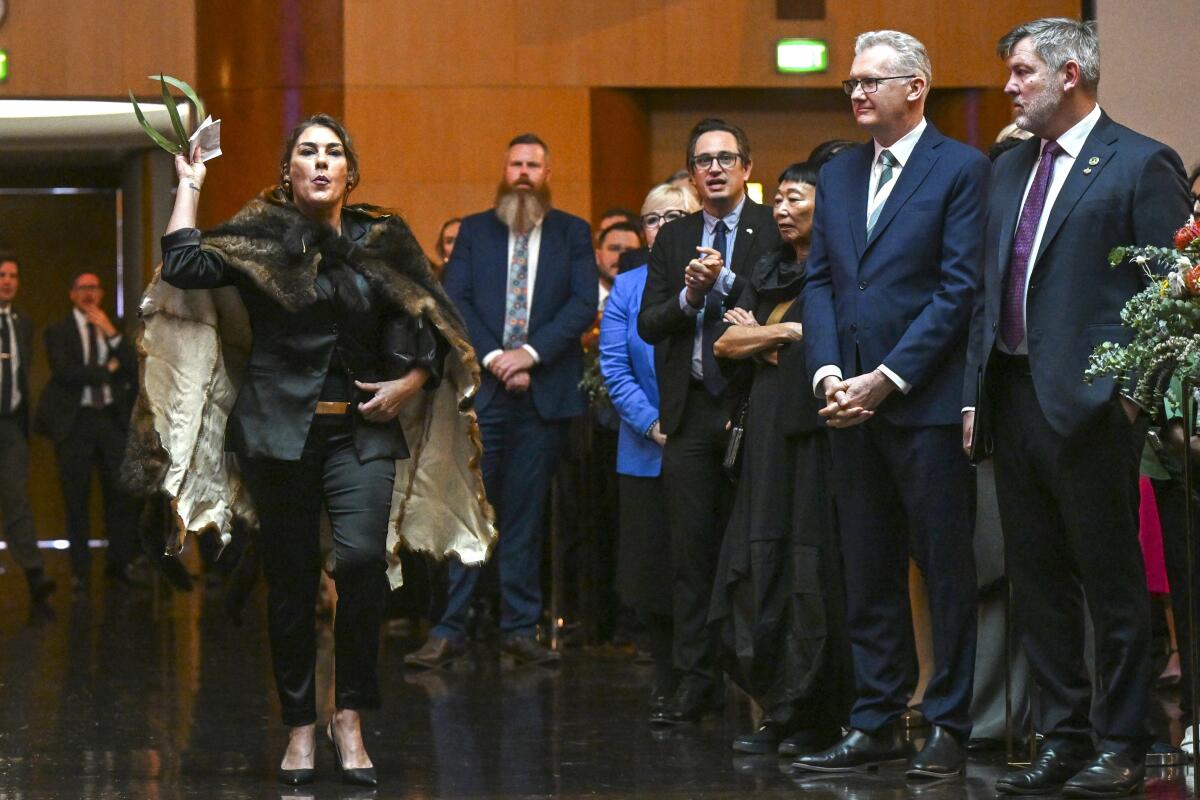
An Indigenous senator told King Charles III that Australia is not his land as the British royal visited Australia’s parliament on Monday.
Sen. Lidia Thorpe was escorted out of a parliamentary reception for the royal couple after shouting that British colonizers have taken Indigenous land and bones.
“You committed genocide against our people,” she shouted. “Give us what you stole from us — our bones, our skulls, our babies, our people. You destroyed our land. Give us a treaty. We want a treaty.”
No treaty was ever struck between between British colonizers and Australia’s Indigenous peoples.
Charles spoke quietly with Prime Minister Anthony Albanese while security officials stopped Thorpe from approaching.
“This is not your land. You are not my king,” Thorpe yelled as she was ushered from the hall.
Thorpe is renowned for high-profile protest action. When she was affirmed as a senator in 2022, she wasn’t allowed to describe the then-monarch as “the colonizing Her Majesty Queen Elizabeth II.” She briefly blocked a police float in Sydney’s Gay and Lesbian Madri Gras last year by lying on the street in front of it. Last year, she was also banned for life from a Melbourne strip club after video emerged of her abusing male patrons.
Albanese, who wants the country to become a republic with an Australian head of state, made an oblique reference to the issue in his speech welcoming the monarch.
“You have shown great respect for Australians, even during times when we have debated the future of our own constitutional arrangements and the nature of our relationship with the Crown,” Albanese said. But, he said, “nothing stands still.”
Opposition leader Peter Dutton, who wants to keep the British king as Australia’s monarch, said that many supporters of a republic were honored to attend a reception for the Charles and Queen Camilla at Parliament House in the capital Canberra.
“People have had haircuts, people have shined shoes, suits have been pressed and that’s just the republicans,” Dutton quipped.
But Australia’s six state government leaders signaled their support for an Australian head of state by declining invitations to the reception. They each said they had more pressing engagements on Monday, but monarchists agreed the royals had been snubbed.
Charles used the start of his speech to thank Canberra Indigenous elder Auntie Violet Sheridan for her traditional welcome to the king and queen.
“Let me also say how deeply I appreciated this morning’s moving Welcome to Country ceremony, which offers me the opportunity to pay my respects to the traditional owners of the lands on which we meet, the Ngunnawal people, and all First Nations peoples who have loved and cared for this continent for 65,000 years,” Charles said.
“Throughout my life, Australia’s First Nations peoples have done me the great honor of sharing so generously their stories and cultures. I can only say how much my own experience has been shaped and strengthened by such traditional wisdom,” Charles added.
Australians decided in a referendum in 1999 to retain Queen Elizabeth II as head of state. That result is widely regarded to have been the consequence of disagreement about how a president would be chosen rather than majority support for a monarch.
Albanese has ruled out holding another referendum on the subject during his current three-year term in government. But it is a possibility if his center-left Labor Party is re-elected at elections due by May next year.
Charles was drawn into Australia’s republic debate months before his visit.
The Australian Republic Movement, which wants Australia to sever its constitutional ties with Britain, wrote to Charles in December last year requesting a meeting in Australia and for the king to advocate their cause. Buckingham Palace politely wrote back in March to say the king’s meetings would be decided upon by the Australian government. A meeting with the ARM does not appear on the official itinerary.
“Whether Australia becomes a republic is … a matter for the Australian public to decide,” the Buckingham Palace letter said.
Earlier Monday, Charles and Camilla laid wreaths at the Australian War Memorial, then shook hands with well-wishers on the second full day of their visit.
The memorial estimated 4,000 people had turned out to see the couple.
Charles, 75, is being treated for cancer, which has led to a scaled-down itinerary. It is Charles’ 17th trip to Australia and the first since he became king in 2022. It is the first visit to Australia by a reigning British monarch since his late mother Queen Elizabeth II traveled to the distant nation in 2011.
Charles and Camilla rested the day after their arrival late Friday before making their first public appearance of the trip at a church service in Sydney on Sunday. They then flew to Canberra where they visited the Tomb of the Unknown Australian Soldier and a reception at Parliament House.
Before leaving the war memorial, they stopped to greet hundreds of people who gathered under clear skies flying Australian flags.
On Wednesday, Charles will travel to Samoa, where he will open the Commonwealth Heads of Government Meeting.